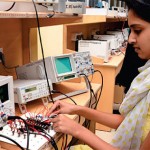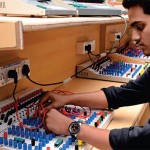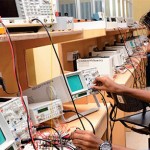Electronics And Communication Engineering
The Department of Electronics and Communication Engineering, ACS College of Engineering was started in 2009. The department has consistently intended to produce Electronics & Communication Engineering graduates of exceptional quality and caliber.
The fast changing technological scenario poses to the Institute a challenge of continuously updating its curriculum and faculty to be able to provide state-of-the-art education to the students. Changes, both major and subtle, have been made by the department of Electronics and communication engineering, to be better prepared for tomorrow.
QUALITY POLICY
To Empower the Students to inculcate the importance of Standard of Education, knowledge and Ethics. To prepare them to meet the challenges of Life with Full Confidence. Aim to develop their Personality to be useful to the society.
Vision
Impart quality education to create world class technocrats and entrepreneurs with new ideas and innovations to meet industry expectations through advanced research.
Mission
- To Develop and deliver Quality academic programmes in Emerging and innovative field of Engineering to empower the students to meet Industry Standards.
- To build student community with high ethical standards to undertake R&D in thrust areas of national and international needs.
- To create centre of Excellence by establishing the incubation centres to meet global research challenges.
Programme Educational Objectives
- To develop the ability among students to understand the concept of core electronics subjects that will facilitate understanding of new technology.
- To embed a strong foundation in the engineering fundamentals to solve, analyze and design real time engineering products.
- To give exposures to emerging edge technologies, adequate training and opportunities to work as team on multidisciplinary projects with effective communication skills and leadership qualities.
Program Specific Outcomes (PSO’S)
- PSO1: To analyse, design and develop solutions by applying fundamental concepts of Electronics and Communication Engineering.
- PSO2: Design and implement the products using cutting edge technologies in hardware and Software, to demonstrate leadership qualities among students, to promote research and development activities for betterment of organization and society.
Program Outcomes (PO’S)
- PO1:Engineering Knowledge: Apply the knowledge of mathematics, science, engineering fundamentals, and an engineering specialization to the solution of complex engineering problems.
- PO2:Problem analysis: Identify, formulate, review research literature, and analyse complex engineering problems reaching substantiated conclusions using first principles of mathematics, natural sciences, and engineering sciences.
- PO3:Design/development of solutions Design solutions for complex engineering problems and design system components or processes that meet the specified needs with appropriate consideration for the public health and safety, and the cultural, societal, and environmental considerations.
- PO4: Conduct investigations of complex problems: Use research-based knowledge and research methods including design of experiments, analysis and interpretation of data, and synthesis of the information to provide valid conclusions.
- PO5: Modern Tool Usage Create, select, and apply appropriate techniques, resources, and modern engineering and IT tools including prediction and modelling to complex engineering activities with an understanding of the limitations.
- PO6: The Engineer and Society Apply reasoning informed by the contextual knowledge to assess societal, health, safety, legal and cultural issues, and the consequent responsibilities relevant to the professional engineering practice.
- PO7: Environment and Sustainability Understand the impact of the professional engineering solutions in societal and environmental contexts, and demonstrate the knowledge of, and need for sustainable development.
- PO8: Ethics Apply ethical principles and commit to professional ethics and responsibilities and norms of the engineering practice.
- PO9:Individual and Team Work: Function effectively as an individual, and as a member or leader in diverse teams, and in multidisciplinary settings.
- PO10:Communication Communicate effectively on complex engineering activities with the engineering community and with society at large, such as, being able to comprehend and write effective reports and design documentation, make effective presentations, and give and receive clear instructions.
- PO11: Project Management and Finance Demonstrate knowledge and understanding of the engineering and management principles and apply these to one’s own work, as a member and leader in a team, to manage projects and in multidisciplinary environments.
- PO12: Life-long learning Recognize the need for, and have the preparation and ability to engage in independent and life-long learning in the broadest context of technological change.
ABOUT THE DEPARTMENT
The department of Electronics and Communication Engineering was established in the year 2009 with an intake of 60 for UG. The PG course is started in the year 2014 with an intake of 18.
The department offers excellent facilities and has well equipped State of the Art laboratory. The department is further strengthened by a team of well experienced and highly qualified faculty members who are committed to their profession. The highly motivated faculties encourage the students to give their best, strive to provide them all round knowledge in theory, practical work and guide them in all other academic activities like seminars, projects, training, etc.
The Department has signed MoUs with various organizations to provide live projects for UG and PG final year students in the field of DSP, VLSI, Embedded Systems, and Communication Systems etc. Regular Industrial visits, workshops, internships and mini-projects are organized for students.
The students of the department are placed in various reputed organizations such as MindTree, Capgemini,Cognizant, IBM, Cerner, VeriZon, VMware, Reddonatura, and other reputable industries.
ECE – SAR
NBA SAR 2023ECE – Event Conduction
2022-232021-22
2020-21
2019-20
ECE – Publications
View Publication Details 2022-23ECE – Notes
NotesECE – Lab Manual
Analog Circuits Lab ManualBSP Lab Manual
CCN Lab Manual
Circuit and Control System Lab Manual
Communication Lab Manual
DSD(18ECL38) Lab Manual
DSDV Lab Manual(3rd Sem)
Electronic Devices and Instrumentation Lab Manual
HDL Lab Manual
HDL Manual 21 scheme Lab Manual
View Lab Details
ECE – MOU
CADMAXX MOU GMAT MOU PRINTON MOU Edgate Technologies AAKSPRO Research foundation Infotech Solutions Infotech Solutions BSNL UNIQAL keep IT simple Logichive Solutions IETE Knowledge SolutionsECE – Activities
View Department ActivitiesECE – Industrial Visit
2022-23 2021-22 2019-20ECE – Faculty Achievements
View Faculty Achievements AchievementECE – Placement Details
2018-22 2017-21 2016-20ECE – Infrastructure
The Infrastructure and Lab Facilities are upgraded as per VTU norms from time to ime and provide adequate opportunities for students and researchers to learn nd innovate. A variety of trainer kits are provided in all the laboratories to onduct experiments. Well-qualified and experienced instructors are appointed to trainthe students in the laboratory. Entire ECE Department is well connected through WI-FI.
ECE – Internship
View Internship 2022-23 View Internship 2021-22 View Internship 2020-21 View Internship 2019-20 View Internship 2018-19 View Internship 2017-18 View Internship 2016-17ECE – Newsletter
View Newsletter 2022-23View Newsletter 2020-21
View Newsletter 2019-20
View Newsletter 2018-19
View Newsletter 2017-18
View Newsletter 2015-16
View Newsletter 2014-15












